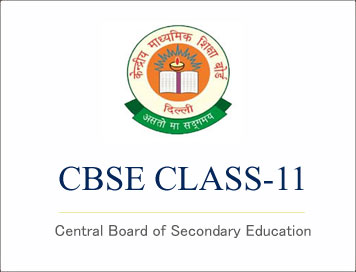CBSE Class-11 Syllabus 2018-19 (Psychology)
Disclaimer: This website is NOT associated with CBSE, for official website of CBSE visit - www.cbse.gov.in
CBSE Class-11 Syllabus 2018-19 (Psychology)
Rationale :
Psychology is introduced as an elective subject at the higher secondary stage of school education. As a discipline, psychology specializes in the study of experiences, behaviours, and mental processes of human beings within a socio-cultural historical context. This course purports to introduce the learners to the basic ideas, principles, and methods in Psychology. The emphasis is to create interest and exposure needed by learners to develop their own knowledge base and understanding.
The course deals with psychological knowledge and practices which are contextually rooted. It emphasizes the complexity of behavioural processes and discourages simplistic cause-effect thinking. This is pursued by encouraging critical reasoning, allowing students to appreciate the role of cultural factors in behaviour, and illustrating how biology and experiences shape behaviour.
It is suggested that the teaching - learning processes should involve students in evolving their own understanding, therefore, teaching of Psychology should be based on the use of case studies, narratives, experiential exercises, analysis of common everyday experiences, etc.
Objectives:
- To develop appreciation about human mind and behaviour in the context of learners’ immediate society and environment.
- To develop in learners an appreciation of the nature of psychological knowledge and its application to various aspects of life.
- To enable learners to become perceptive, socially aware and self-reflective.
- To facilitate students’ quest for personal growth and effectiveness, and to enable them to become responsive and responsible citizens.
Cource Structure :
|
Units |
Topics |
Periods |
Weightage in Marks |
|
I |
What is Psychology? |
16 |
7 |
|
II |
Methods of Enquiry in Psychology |
20 |
10 |
|
III |
The Bases of Human Behaviour |
20 |
8 |
|
IV |
Human Development |
16 |
6 |
|
V |
Sensory, Attentional and Perceptual Processes |
20 |
8 |
|
VI |
Learning |
22 |
9 |
|
VII |
Human Memory |
20 |
8 |
|
VIII |
Thinking |
18 |
7 |
|
IX |
Motivation and Emotion |
18 |
7 |
|
|
Total |
170 |
70 |
::COURSE CONTENT::
Unit I: What is Psychology?
1. Introduction
2. What is Psychology?
a) Psychology as a Discipline
b) Psychology as a Natural Science
c) Psychology as a Social Science
3. Understanding Mind and Behaviour
4. Popular Notions about the Discipline of Psychology
5. Evolution of Psychology
6. Development of Psychology in India
7. Branches of Psychology
8. Themes of Research and Applications
9. Psychology and Other Disciplines
10. Psychologists at Work
11. Psychology in Everyday Life
Unit II: Methods of Enquiry in Psychology
The topics in this unit are:
1. Introduction
2. Goals of Psychological Enquiry
a) Steps in Conducting Scientific Research
b) Alternative Paradigms of Research
3. Nature of Psychological Data
4. Some Important Methods in Psychology
a) Observational Method
b) Experimental Method
c) Correlational Research
d) Survey Research
e) Psychological Testing
f) Case Study
5. Analysis of Data
a. Quantitative Method
b. Qualitative Method
6. Limitations of Psychological Enquiry
7. Ethical Issues
Unit III: The Bases of Human Behaviour
The topics in this unit are:
1. Introduction
2. Evolutionary Perspective
3. Biological and Cultural Roots
4. Biological Basis of Behaviour
a) Neurons
5. Structure and Functions of Nervous System and Endocrine System and their Relationship with Behaviour and Experience
a) The Nervous System
b) The Endocrine System
6. Heredity: Genes and Behaviour
7. Cultural Basis : Socio-Cultural Shaping of Behaviour
a) Concept of Culture
8. Enculturation
9. Socialisation
10. Acculturation
Unit IV: Human Development
The topics in this unit are:
1. Introduction
2. Meaning of Development
a) Life-Span Perspective on Development
3. Factors Influencing Development
4. Context of Development
5. Overview of Developmental Stages
a) Prenatal Stage
6. Infancy
7. Childhood
8. Challenges of Adolescence
9. Adulthood and Old Age
Unit-V: Sensory, Attentional, and Perceptual Processes
The topics in this unit are:
1. Introduction
2. Knowing the world
3. Nature and varieties of Stimulus
4. Sense Modalities
Click Here To Download Full Syllabus
Courtesy: CBSE
